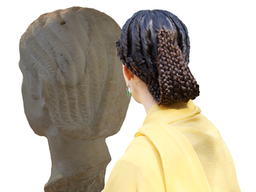Ancient Studies Week: In Comis Veritas
The Principles of Ancient Roman Hairdressing
Location
Library and Gallery, Albin O. Kuhn
Date & Time
October 14, 2015, 4:00 pm – 5:00 pm
Description
Ancient Studies Week
In Comis Veritas:The Principles of Ancient Roman Hairdressing
Janet Stephens, Independent scholar and hairstylist
Through
her groundbreaking research, professional hairdresser and self-trained
experimental archaeologist Janet Stephens rediscovered the methods used
to recreate ancient Roman hairstyles using only natural hair rather than
wigs, as was previously believed to have worn. In this lecture and
demonstration she will explain the universal rules governing hair
behavior so that you too may recognize the truth in any hairstyle,
ancient Roman or modern.
Ancient
Roman portraits with their distinctive hairstyles are crucially
important to archaeology. These hairstyles help identify historical
individuals and to date artifacts.
While the
iconography of ancient Roman hairstyles is well established, other
important questions remained unanswered—What tools and techniques were
used to create these hairstyles? Were Roman hairstyles made from natural
hair or were they wigs? Were Roman hairstyles actually real or were they simply imagined by the sculptor?
Bio:
Janet
Stephens is a professional hairdresser in Baltimore Maryland. She is a
self-trained experimental archaeologist specializing in the technical
recreation of ancient Mediterranean hairstyles. Her groundbreaking 2008
article, “Ancient Roman hairdressing: on (hair) pins and needles” was
published in the prestigious Journal of Roman Archaeology.
She presents her work internationally at museums, universities and
archaeological conferences. Her work has been covered by the Wall Street Journal,
NPR, the BBC, and she has created dozens of historical hairdressing
tutorials for her popular YouTube channel. She holds a B.A. in Dramatic
Arts from Whitman College, Walla Walla, Washington.
Sponsored by the Ancient Studies Department and the Dresher Center for the Humanities.
Tags:
